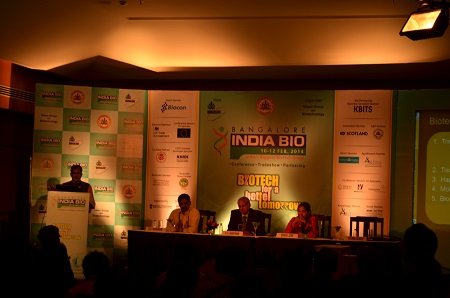Scientists called upon to lead at BIB 2014
February 11, 2014 | Tuesday | News | By BioSpectrum Bureau
The highly anticipated second day of the 14th edition of the Bangalore India Bio 2014 had many thoughts being spelt out in every session – the fiery debates that were initiated at the event continued in the same vein
From drug discovery and vaccine development to biosimilars and the fight to attain global standards and even the thought provoking session on AgriBiotech - the second day of Bangalore India Bio 2014 had a wide range of sessions
Bangalore: In the next 50 years, innovation will be driven from the East. Karnataka's Biotech industry accounts for a third of the revenues of the Biotech sector which is currently worth $7.5 billion in the country and has huge potential. With these thoughts reverberating through day one of the 14th edition of the Bangalore India Bio 2014, the second day of the three day event had many thoughts being spelt out in various sessions spanning through the day.
The day opened with the plenary and keynote lecture by the World Food Prize Laureate 2013, Professor Dr Marc Van Montagu, also founder and chairman of the Institute of Plant Biotechnology Outreach (IPBO), Belgium.
Dr Montagu emphasized on how we are running out of raw materials like petroleum and that new materials are already in labs. "Biotechnology will play an important role in creating new raw materials that will help the chemical industry," he said.
He key message that he stressed upon was that the 21st century plants will be with GMOs.
Dr Montagu said that the argument against GM crops is mixed up with many things, including emotional issues. Addressing the productivity challenge, he said, "We require plants to deliver stable production and for this we need to return to the fields."
Science, he opined is an opportunity to drive home solutions. The World Food Prize Laureate 2013 called upon the scientists' community to lead the industry. He said, "Scientists have to mobilize and will have to lead the way. They will have to do sustainable intensification."
Further emphasis was laid on how many not-for-profit organizations are in an attempt to seek power, spreading mis-interpreted data. This, he said is extremely unwise.
The enormously growing population in India has posed a challenge. "This challenge can be met by governance, which will need science and engineering to turn the challenges into economic opportunities."
He also added that adoption of technology takes time and hence we need to be more patient.
Meanwhile, the wide panel also raised concerns regarding the turbulent clinical trial weather in the country. The secretary of the Department of Biotechnology, Mr K Vijay Raghavan said that regulations need to be relaxed for the smooth conduct of clinical trials. "Activists say clinical trials cannot be done unless regulations are met. But one can't say that trials cannot be done unless all extreme views are satisfied, which is a very dangerous position. The result of that would be, those who are rich would buy all the drugs and others would suffer," he explained.
Mr S R Patil, Karnataka IT Minister too raised concerns regarding clinical trial restrictions. "You can understand our limitations on the issue because it is an international issue. Also in India, there are legal and ethical dimensions in it. I see an urgent need for consensus among industry, NGOs, government and judiciary," he said.









